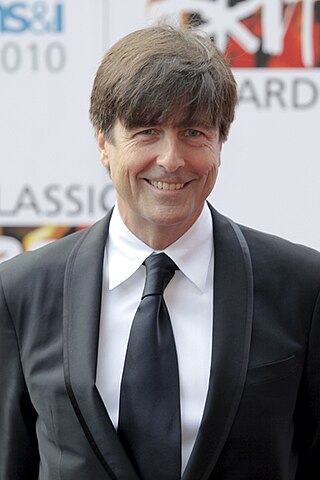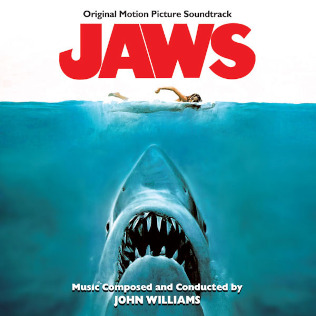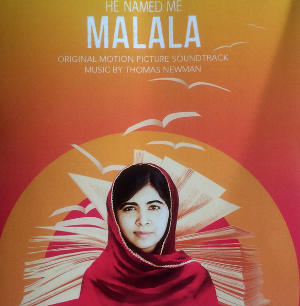
John Towner Williams is an American composer and conductor. In a career that has spanned seven decades, he has composed some of the most popular, recognizable, and critically acclaimed film scores in cinema history. He has a very distinct sound that mixes romanticism, impressionism, and atonal music with complex orchestration. He is best known for his collaborations with Steven Spielberg and George Lucas and has received numerous accolades including 26 Grammy Awards, five Academy Awards, seven BAFTA Awards, three Emmy Awards, and four Golden Globe Awards. With 54 Academy Award nominations, he is the second-most nominated person, after Walt Disney, and is the oldest Oscar nominee in any category, at 91 years old.

Thomas Montgomery Newman is an American composer and conductor best known for his many film scores. In a career that has spanned over four decades, he has scored numerous films including The Player (1992), The Shawshank Redemption (1994), The Horse Whisperer (1998), American Beauty and The Green Mile, Pay It Forward (2000), In the Bedroom (2001), Road to Perdition and White Oleander, Finding Nemo (2003) and its sequel Finding Dory (2016), Lemony Snicket's A Series of Unfortunate Events (2004), Cinderella Man (2005), WALL-E (2008), the James Bond films Skyfall (2012) and Spectre (2015), Bridge of Spies (2015), 1917 (2019), and Elemental (2023). He also composed the music for the HBO drama series Six Feet Under (2001) and 2003 miniseries Angels in America. Throughout his career, he has collaborated extensively with directors such as Sam Mendes, Andrew Stanton, Frank Darabont, Steven Soderbergh, Jon Avnet, John Madden and John Lee Hancock.

The Jaws soundtrack is the music composed and conducted by John Williams for Steven Spielberg's 1975 film Jaws. The soundtrack is particularly notable for the 2-note ostinato which represents the shark, a theme so simple that Spielberg initially thought it was a joke by the composer.

Saving Private Ryan: Music from the Original Motion Picture Soundtrack is the soundtrack album for the 1998 film Saving Private Ryan, directed by Steven Spielberg. The album was produced by composer John Williams and distributed by DreamWorks Records. Recorded in Symphony Hall, Boston, Massachusetts, the scores were performed by the Boston Symphony Orchestra, with two of the ten compositions featuring vocals from the Tanglewood Festival Chorus. The soundtrack runs for just over an hour, while the film itself lasts over two hours.

The BFG is a 2016 fantasy adventure film directed and co-produced by Steven Spielberg, written by Melissa Mathison and based on Roald Dahl's 1982 novel of the same name. The film stars Mark Rylance, Ruby Barnhill in her film debut, Penelope Wilton, Jemaine Clement, Rebecca Hall, Rafe Spall and Bill Hader. In the film, a ten-year-old orphaned girl named Sophie befriends a benevolent giant dubbed the "Big Friendly Giant", who takes her to Giant Country, where they attempt to stop the man-eating giants that are invading the human world.

Bridge of Spies is a 2015 American historical drama film directed and co-produced by Steven Spielberg, written by Matt Charman and the Coen brothers, and starring Tom Hanks in the lead role, Mark Rylance, Amy Ryan, and Alan Alda. Set during the Cold War, the film tells the story of lawyer James B. Donovan, who is entrusted with negotiating the release of Francis Gary Powers—a convicted Central Intelligence Agency pilot whose U-2 spy plane was shot down over the Soviet Union in 1960—in exchange for Rudolf Abel, a convicted Soviet KGB spy held by the United States, whom Donovan represented at trial. The name of the film refers to the Glienicke Bridge, which connects Potsdam with Berlin, where the prisoner exchange took place. The film was an international co-production of the United States and Germany.

Logan: Original Motion Picture Soundtrack is the score album to the 2017 film of the same name, featuring the Marvel Comics character Wolverine. It is the tenth installment in the X-Men film series and the third and final installment in the Wolverine trilogy following X-Men Origins: Wolverine (2009) and The Wolverine (2013). The film is directed by James Mangold, and featured musical score composed by Marco Beltrami, having previously worked together in the predecessor.

The Wolverine (Original Motion Picture Soundtrack) is the soundtrack album to the 2013 superhero film of the same name, directed by James Mangold. Featuring the Marvel Comics character Wolverine, the film is the sixth installment in the X-Men film series, the second installment in the trilogy of Wolverine films after X-Men Origins: Wolverine (2009), and a spin-off/sequel to X-Men: The Last Stand (2006). The film's musical score is composed by Marco Beltrami, who previously scored Mangold's 3:10 to Yuma (2007).

Music from the Motion Picture: The Adventures of Tintin: The Secret of the Unicorn is the soundtrack for the 2011 animated action/adventure film The Adventures of Tintin directed and produced by Steven Spielberg, based on Belgian cartoonist Hergé's comic book series The Adventures of Tintin. The film score is composed by John Williams, which is the first time he had composed the score of a film since Indiana Jones and the Kingdom of the Crystal Skull (2008) as well as his first score for an animated film. The score was released on 21 October 2011 by Sony Classical Records. Williams received a nomination for Best Original Score at the 84th Academy Awards for his work in the film.

Lincoln (Original Motion Picture Soundtrack) is the score album to the 2012 biographical historical drama film Lincoln, based on the Doris Kearns Goodwin's 2005 biography Team of Rivals: The Political Genius of Abraham Lincoln, a semi-biographical novel that covers the final four months of United States President Abraham Lincoln's life. The film is directed by Steven Spielberg, from a screenplay written by Tony Kushner and featured musical score composed by John Williams, Spielberg's frequent collaborator. The orchestral score was recorded at Symphony Center, Chicago by the Chicago Symphony Orchestra and the Chicago Symphony Chorus. It was released by Sony Classical on November 2, 2012.

War Horse (Original Motion Picture Soundtrack) is the score album to the 2011 film of the same name directed by Steven Spielberg. Spielberg's norm collaborator John Williams composed and conducted the score for the film, the second score composed the same year by Williams for Spielberg after The Adventures of Tintin. The score featured a 90-piece orchestra performing the orchestral music and was recorded during March and April 2011. It was released on 21 December 2011 by Sony Classical Records, four days prior to the film's release. The soundtrack was also released in German in February 2012, to accompany with the dubbed release of Gefährten in Germany.

Incredibles 2 (Original Motion Picture Soundtrack) is the soundtrack album to the 2018 film Incredibles 2, the sequel to Pixar's The Incredibles (2004). The film is directed by Brad Bird and featured musical score composed by Michael Giacchino, who also worked on the predecessor. The recording of the score began during mid-2017 and continued till May 2018, at the Sony Scoring Stage in California. The soundtrack album was released digitally, alongside the film, on June 15, by Walt Disney Records and in CDs on June 29. The soundtrack featured Giacchino's scores as well as vocalised theme songs for Mr. Incredible, Frozone, and Elastigirl featured in the credits. The digital release also featured bonus versions of the theme songs sung by Disney's a cappella group, DCappella, and their version of the track "The Glory Days" from the predecessor.

Maleficent (Original Motion Picture Soundtrack) is the score album composed by James Newton Howard for the 2014 film Maleficent, based on the Disney villain character Maleficent from the animated film Sleeping Beauty (1959). The film is a live-action spin-off of Sleeping Beauty, and is loosely inspired from Charles Perrault's original fairy tale. Directed by Robert Stromberg, the film stars Angelina Jolie in the titular character.

Mission: Impossible – Ghost Protocol is the score album to the 2011 film Mission: Impossible – Ghost Protocol. The fourth installment in the Mission: Impossible film series, starring Tom Cruise, and the sequel to Mission: Impossible III (2006), the film is directed by Brad Bird and featured musical score composed by Michael Giacchino, who scored for Mission: Impossible III (2006), and also for Bird's previous animated films, The Incredibles (2004) and Ratatouille (2007). Varèse Sarabande released the soundtrack on December 13, 2011.

The BFG (Original Motion Picture Soundtrack) is the score album for the 2016 film of the same name, directed by Steven Spielberg. It featured a musical score composed by Spielberg's regular collaborator John Williams and was released on July 1, 2016 (the same date as the film's release) by Walt Disney Records.

The Post (Original Motion Picture Soundtrack) is the score album to the 2017 film of the same name, directed by Steven Spielberg. The film's musical score is composed by Spielberg's regular collaborator John Williams, in his twenty-eighth collaboration with the director, and is a combination of traditional instrumentation and orchestration. The album was released digitally by Sony Classical Records on December 22, 2017, and was released in CDs on January 12, 2018, coinciding with the film's limited and wide theatrical release in the United States. The album received positive reviews and earned several nominations at award ceremonies, including Critics' Choice Movie Award and Golden Globe Award for "Best Original Score".

Ready Player One is a 2018 American science fiction action film based on Ernest Cline's novel of the same name, directed by Steven Spielberg from a screenplay by Zak Penn and Cline. The film stars Tye Sheridan, Olivia Cooke, Ben Mendelsohn, Lena Waithe, T.J. Miller, Simon Pegg, and Mark Rylance.

Rise of the Planet of the Apes (Original Motion Picture Soundtrack) is the score album to the 2011 film Rise of the Planet of the Apes, a reboot of the Planet of the Apes film franchise. The film's original score was composed by Patrick Doyle, and was released by Varèse Sarabande on August 9, 2011.

He Named Me Malala (Original Motion Picture Soundtrack) is the soundtrack to the 2015 documentary film of the same name about young Pakistani female activist and Nobel Peace Prize laureate Malala Yousafzai. The album was released digitally on October 2, 2015 and through physical formats on October 30 by Sony Classical. It consisted the film's original score composed by Thomas Newman, while also featured two original songs that are not included in the album.

Super 8 (Music from the Motion Picture) is the score album composed by Michael Giacchino for the 2011 film of the same name directed by J. J. Abrams. The album was released on June 13, 2011 by Varèse Sarabande featuring 33 tracks from Giacchino's orchestral score. The music featured influences of John Williams' score for earlier-Steven Spielberg directorials (Spielberg also served as the film's producer, through Amblin Entertainment) and was recorded in a short span of time. It received critical acclaim for the subtlety, minimalism, nostalgia factor and paying homage to Williams' with being considered as one of the film's best aspects. Giacchino won the Saturn Award for Best Music for his work in the film.




















